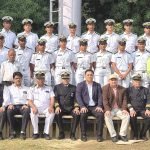
In the modern maritime industry, simulator courses play a pivotal role in training merchant navy officers. These courses provide a realistic and risk-free environment to develop the technical and operational skills required for efficient ship management. Whether you’re training for engine room operations, navigation, or emergency scenarios, simulators offer hands-on experience that closely mimics real-world challenges.
Here’s a comprehensive overview of the Essential Simulator Courses For Merchant Navy Officers and how they contribute to maritime excellence.
The Engine Room Simulator (ERS) course is one of the most critical training modules for marine engineers. It focuses on the operation and maintenance of machinery in the ship’s engine room.
Key Objectives:
Who Needs This Course?
Why It’s Essential:
The ERS course builds confidence in managing complex machinery and prepares officers for emergencies without risking real-world operations.
This simulator course focuses on monitoring and managing combustion gases in diesel engines, ensuring safe and efficient engine performance.
Key Objectives:
Who Needs This Course?
Why It’s Essential:
With increasing environmental regulations, this course ensures officers are equipped to manage emissions effectively while optimizing engine performance.
The Navigation Simulator course is vital for deck officers, focusing on safe navigation practices using advanced technology.
Key Objectives:
Who Needs This Course?
Why It’s Essential:
This course enhances situational awareness, helping officers navigate complex shipping lanes safely and efficiently.
Cargo operations are a critical aspect of merchant navy responsibilities. The Cargo Handling Simulator course provides practical training in loading, unloading, and securing cargo.
Key Objectives:
Who Needs This Course?
Why It’s Essential:
This course minimizes the risks associated with cargo handling, ensuring safety, stability, and compliance with international regulations.
The Bridge Resource Management (BRM) simulator focuses on teamwork, communication, and decision-making in bridge operations.
Key Objectives:
Who Needs This Course?
Why It’s Essential:
BRM ensures smooth and efficient bridge operations, reducing the risk of accidents caused by human error.
This simulator course prepares officers to handle emergencies, such as fires, floods, or collisions.
Key Objectives:
Who Needs This Course?
Why It’s Essential:
This course equips officers to protect lives, property, and the environment during emergencies.
Modern ships operate with high-voltage systems, making safety training essential for marine engineers.
Key Objectives:
Who Needs This Course?
Why It’s Essential:
High-voltage training ensures the safety of personnel and equipment, preventing electrical hazards onboard.
For officers working on tankers, this simulator course focuses on the safe handling of liquid cargo.
Key Objectives:
Who Needs This Course?
Why It’s Essential:
This course ensures compliance with international safety standards and reduces the risks associated with liquid cargo handling.
Ship handling is a critical skill for senior officers. This simulator course focuses on maneuvering large vessels in challenging conditions.
Key Objectives:
Who Needs This Course?
Why It’s Essential:
This course builds confidence in managing large vessels, ensuring safety during critical operations.
Dynamic Positioning systems are crucial for vessels that need precise positioning, such as offshore supply ships and drillships.
Key Objectives:
Who Needs This Course?
Why It’s Essential:
This course ensures precision and safety in operations requiring fixed positioning.
Benefits of Simulator Training
Simulator courses are indispensable for merchant navy officers, providing the skills and confidence required for modern maritime operations. From engine room operations to navigation and crisis management, these courses ensure that officers are well-prepared to handle the challenges of life at sea. As the maritime industry continues to evolve, simulator training will remain a cornerstone of professional development, setting the standard for safety and efficiency onboard.
 The Caravel Group Appoints Angad Banga as Group Chief Executive Officer
The Caravel Group Appoints Angad Banga as Group Chief Executive Officer  IMI Celebrates 40 Graduating Cadets of Diploma in Nautical Sciences Batch 42 at Grand Passing-Out Ceremony
IMI Celebrates 40 Graduating Cadets of Diploma in Nautical Sciences Batch 42 at Grand Passing-Out Ceremony  Fleet Management Team Visits IMI Campus
Fleet Management Team Visits IMI Campus  Passing-Out Ceremony of ETO‑17 and GME‑42 Batches
Passing-Out Ceremony of ETO‑17 and GME‑42 Batches  Dr Harry Banga Inspires IMI Cadets
Dr Harry Banga Inspires IMI Cadets